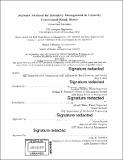Network methods for inventory management in capacity constrained retail stores
Author(s)
Macmillan, Michael Reed
DownloadFull printable version (4.131Mb)
Other Contributors
Leaders for Global Operations Program.
Advisor
Georgia Perakis and Abbott Weiss.
Terms of use
Metadata
Show full item recordAbstract
Zara leads the fast-fashion industry introducing over 12,000 unique items per year [5], selling in over 2,000 stores and generating rch16091 [British pound symbol]11.6 Bn in yearly sales [8]. Critical to this success, Zara's Distribution Department continually focuses on improving the algorithms and programs which the company uses to move clothing through the supply chain. Demand variability and short product lifecycles make this task extremely challenging, especially when coupled with limited storage space in many Zara stores. This thesis helps stores which are challenged by low storage capacity and high consumer demand by testing three inventory management methods. The first method creates a virtual cost in the inventory redistribution algorithm, which decreases the likelihood that an over-capacity store will hold an item. This method decreased the amount of post transfer inventory by 15 % in capacity constrained stores while only experiencing a .1% loss of profits when compared to the current process. The second method opens new transfer routes for capacity constrained stores to move inventory into stores which benefit from the additional items, while reducing the non-performing stock at the capacity constrained store. These store to store routes quickly transfer items while reducing the stock of the origin store. The final method improves existing capacity returns, which automatically move inventory from capacity constrained stores back to the Distribution Center. The new method optimizes the selection of items to improve redistribution to other stores, resulting in additional full priced sales, while removing the same amount of items from the origin store. The implementation of these processes will reduce stock management problems experienced at Zara stores, while ensuring that other stores have the opportunity to sell at full price.
Description
Thesis: M.B.A., Massachusetts Institute of Technology, Sloan School of Management, 2016. In conjunction with the Leaders for Global Operations Program at MIT. Thesis: S.M. in Engineering Systems, Massachusetts Institute of Technology, School of Engineering, Institute for Data, Systems, and Society, 2016. In conjunction with the Leaders for Global Operations Program at MIT. Cataloged from PDF version of thesis. Includes bibliographical references (pages 81-82).
Date issued
2016Department
Leaders for Global Operations Program at MIT; Massachusetts Institute of Technology. Engineering Systems Division; Massachusetts Institute of Technology. Institute for Data, Systems, and Society; Sloan School of ManagementPublisher
Massachusetts Institute of Technology
Keywords
Sloan School of Management., Institute for Data, Systems, and Society., Engineering Systems Division., Leaders for Global Operations Program.